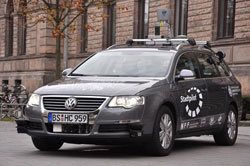First automatic driving in real city traffic world wide

Leonie in front of the TU Braunschweig main building. TU Braunschweig
A world’s first in Braunschweig: For the first time, an automatic vehicle is driving in everyday city traffic today.
In the context of the research project “Stadtpilot”, the Technische Universität Braunschweig has developed a research vehicle in its competence centre Niedersächsisches Forschungszentrum Fahrzeugtechnik: it drives automatically along a given route in normal traffic.
On Braunschweig’s two-lane ring road, the research vehicle “Leonie” is able to conduct challenging driving maneuvers at speeds up to 60 km/h: lane keeping, behavior at intersections, avoiding obstacles, and adjusting distances and speeds to the flowing traffic. The route includes part of the Braunschweig ring road from Hans-Sommer-Straße to the intersection Hamburger Straße, and back. A safety driver ready to intervene in emergencies is compulsory.
Research project “Stadtpilot”
The research project „Stadtpilot“ is the only research project worldwide so far that realizes automatic driving in real city traffic. Already in 2007, the TU Braunschweig participated successfully in the DARPA Urban Challenge, the worldwide leading competition for autonomous vehicles: with the 2006 VW Passat Variant “Caroline”, the team CarOLO was in the finals as one of 11 teams out of the initial 89. Based on these experiences, an interdisciplinary team from three different faculties has now developed the follow-up “Leonie”.
“We have come a long way, from our first vehicle Caroline to Leonie”, Professor Markus Maurer explained. “Whereas, in the competition, we drove in a controlled scenario, it is now necessary to master the real traffic volume. Leonie is confronted by various traffic participants who drive differently, and sometimes even against the rules. It has to adjust its speed to the flowing traffic. And last not least, a substantial safety concept is necessary.”
“To drive autonomously Leonie has to know not only the traffic rules. We teach it all a human also needs to drive. It has to know its own position (through satellite positioning), ‘see’ its environment, evaluate speeds and obstacles (with its sensor concept), assess difficult traffic situations, and recognize dangers in advance. In addition, it must learn to get along with various human drivers in other vehicles”, says project leader Jörn Marten Wille.
It is the goal of the project “Stadtpilot” to drive autonomously around the Braunschweig inner ring road. The extremely complex environment makes the project challenging: the dense traffic on the two lane road is highly demanding for the environment perception; the narrow roads require precise lane planning; and the dense urban built-up area makes the exact positioning difficult.
“Stadtpilot” has been developed mainly at the Mobile Life Campus, the Wolfsburg location of the Niedersächsisches Forschungszentrum Fahrzeugtechnik (NFF). Experts from Control Engineering (Electrical Engineering), Flight Guidance (Mechanical Engineering) of the Technische Universität Braunschweig, as well as the Institute of Transportation Systems of the German Aerospace Center, and the University of Hildesheim. have been contributing to the project. The NFF having research in new concepts for a sustainable automotive mobility as main objective sees the project “Stadtpilot” as an essential research project. It is based at the NFF location in Wolfsburg.
Research vehicle „Leonie“
Leonie is a VW Passat station wagon, 2.0 TDI. With satellite positioning the vehicle can calculate its position in the traffic. Thanks to various laser scanners and radar sensors, Leonie can perceive its environment continuously and process the data.
The State of Lower Saxony has granted an exceptional permission for driving in real traffic (on the Braunschweig ring road). It is based on the expert opinion of the TÜV Nord Mobilität. A safety driver is compulsory. Another driver inputs the data of the traffic signals which are not yet recognized by Leonie.
Since the beginning of this year already, the team of the Stadtpilot project has conducted driving tests on the compound of the former Heinrich-der-Löwe-Kaserne in Braunschweig-Rautheim. Besides Leonie, a second research vehicle, Henry, is being built up within the NFF research field “Intelligent Vehicle”. Henry is not yet ready to drive, though.
Contact:
Prof. Markus Maurer
Dipl.-Ing. Jörn Marten Wille
TU Braunschweig
Institut für Regelungstechnik
Lehrstuhl für elektronische Fahrzeugsysteme
Hans-Sommer-Str. 66
D-38106 Braunschweig
Tel.: +49-531-391-63060
E-Mail: maurer@ifr.ing.tu-bs.de
wille@ifr.ing.tu-bs.de
Contact for the media:
Dr. Elisabeth Hoffmann
Leiterin Presse und Kommunikation
Technische Universität Braunschweig
Pockelsstr. 14, 38106 Braunschweig
Tel.: +49 531 391-4122
e.hoffmann@tu-braunschweig.de
presse@tu-braunschweig.de
www.tu-braunschweig.de/presse
Media Contact
All latest news from the category: Transportation and Logistics
This field deals with all spatial and time-related activities involved in bridging the gap between goods and people, including their restructuring. This begins with the supplier and follows each stage of the operational value chain to product delivery and concludes with product disposal and recycling.
innovations-report provides informative reports and articles on such topics as traffic telematics, toll collection, traffic management systems, route planning, high-speed rail (Transrapid), traffic infrastructures, air safety, transport technologies, transport logistics, production logistics and mobility.
Newest articles

Magnetic Memory Unlocked with Energy-Efficient MRAM
Researchers from Osaka University introduced an innovative technology to lower power consumption for modern memory devices. Stepping up the Memory Game: Overcoming the Limitations of Traditional RAM Osaka, Japan –…

Next-Level System Security: Smarter Access Control for Organizations
Cutting-Edge Framework for Enhancing System Security Researchers at the University of Electro-Communications have developed a groundbreaking framework for improving system security by analyzing business process logs. This framework focuses on…

How Microbial Life Shapes Lime Formation in the Deep Ocean
Microorganisms are everywhere and have been influencing the Earth’s environment for over 3.5 billion years. Researchers from Germany, Austria and Taiwan have now deciphered the role they play in the…



